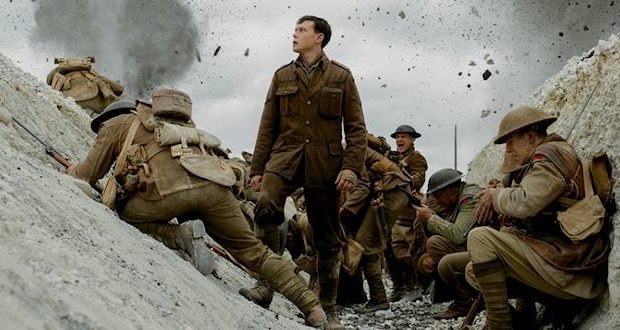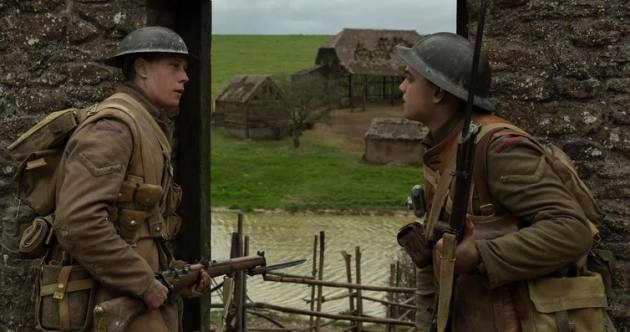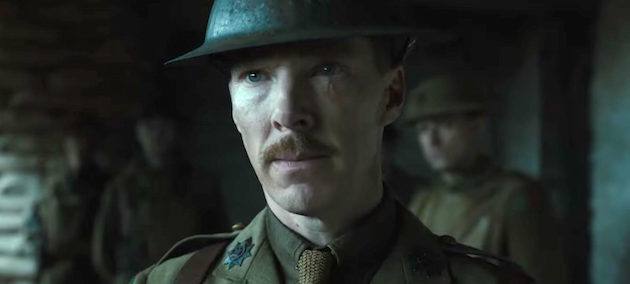For many, The Great War, also known as the War to End All Wars or World War I as it was later known, serves as the most tragic of human events and doomed youth. When a film like 1917 comes along that shows both the horror and humanity that humans are capable of, you almost feel a sense of duty to see it. This was, after all, the war that changed history, and civilization forever.
That sense of duty is something that Lance Cpl. Blake felt as he grabbed Lance Cpl. Schofield sitting nearby when asked to come talk to the general about a mission.
A dangerous mission? Perhaps. But as soldiers in the Great War, sitting was dangerous, too. As was sleeping. Eating. Breathing. Millions had already died in the war by then — by that warm, April day in 1917. Millions more might die before it ended. Blake and Schofield had seen their share of friends fall in this “war to end all wars.” But a mission involving just the two of them couldn’t be that bad, could it? Maybe they’d just be sent to find food, or to take a message through the labyrinthine maze of trenches. “Something fun,” Blake would say later.
READ: 5 things not to miss this month
But when Blake saw the general, he knew this was no mere food run. Generals, when they come to the trenches bring the prospect of more blood.
General Erinmore announces that the Germans, for now, are gone. They’ve pulled out of their own formidable trenches and retreated about nine miles back. Two battalions of British soldiers, led by the battle-hardened Col. Mackenzie, have pursued the enemy and are now preparing to attack. The German retreat, Mackenzie believes, means the enemy is just about out of fight. One last push might break the German lines and bring the interminable conflagration to, finally, a close.
But Mackenzie is wrong.
Erinmore has seen the reconnaissance photos. He’s seen what the Germans are retreating to: the massive web of trenches and fortifications known to the Germans as the Hindenburg Line, the strongest series of entrenchments the world has ever seen. The trenches themselves are lined three deep, with bends and angles forming murderous approaches. Artillery bristles in back, able to literally tear apart anything that’s in range.
To throw 1,600 men against this — it isn’t war. It’s butchery.
And Blake’s older brother is part of the planned attack, set for tomorrow morning.
Erinmore gives Blake and Schofield a grave assignment: Cover the nine miles between here and Mackenzie — through no-man’s land and scorched earth and still-held German territory. And they’ll need to do it alone.
Pick a man, the sergeant said. Grab a kit. For Blake, it’s all well and good. This mission is personal: He has to save his brother. But for Schofield … well, why couldn’t Blake have picked another man?
Schofield is not pleased about being sent on this near-suicide mission. But when Blake tells Schofield that he can go back to the relative safety of the trenches if he wants, Schofield literally soldiers on.
“If you’re going through hell, keep going.”
So said Britain’s great Winston Churchill, who experienced his own political Hades during World War I. He presided over a couple of catastrophic disasters in what was to be one of history’s most horrific wars. Anywhere from 9 to 11 million military personnel died in the conflict. Tack on civilian deaths, and the count just about doubles.
We don’t see all those dead bodies in 1917. But we see enough.
1917 is filmed through one apparent camera and one take though cuts are artfully hidden here and there, making the film appear almost seamless. The camera follows Blake and Schofield through trenches, war-torn landscapes, skeletonized towns and scenes that seemed ripped right from medieval depictions of hell. Director Sam Mendes wants us to be fellow travelers, not just observers. He wants us to see the carnage in a way that feels urgent and raw and real.
It’s a terrible, awful trek that our two soldiers make — one that we appreciate (and loathe) all the more for making it with them. It’s a hellish landscape and we are there for the journey.
But they keep going.
Sam Mendes’ camerawork and storytelling both magnify the horrors of war and humanize those in it. While Blake and Schofield dominate the story, their sparse interactions with their fellow soldiers and civilians are illuminating and sometimes even encouraging—with people offering kindness and care in the middle of the worst possible conditions.
The world Schofield and Blake is a cruel one, and hungry. But in its face, they show courage and sacrifice. By living so vicariously through them, we find just a hint of beauty in all that brutality — a touch of inspiration to go with the tang of all that blood.
There’s a reason the film is up for so many Oscars and if there’s one film of significance you see this year, make it 1917.
–Pluggein
 Metro Voice News Celebrating Faith, Family & Community
Metro Voice News Celebrating Faith, Family & Community











